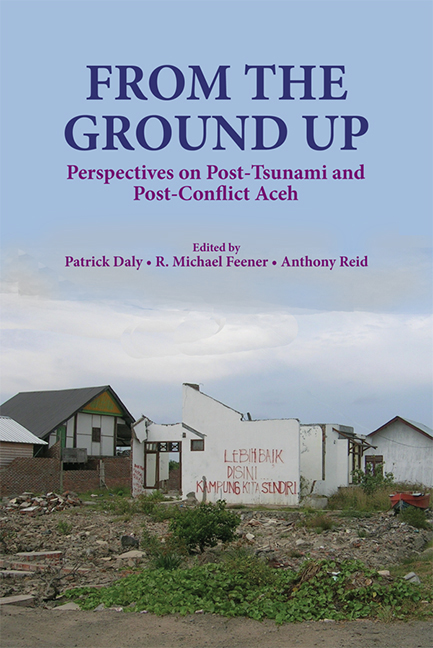Book contents
- Frontmatter
- Contents
- Preface
- List of Figures and Tables
- The Contributors
- Glossary and Abbreviations
- Introduction: Unpacking the Challenges of Post-2004 Aceh
- 1 The Sunda Megathrust: Past, Present and Future
- Part I Reconstruction Efforts
- Part II Conflict Resolution
- 9 Managing Risk: Aceh, the Helsinki Accords and Indonesia's Democratic Development
- 10 Making Peace Agreements Effective: The Aceh Monitoring Mission Experience
- 11 Justice and the Aceh Peace Process
- 12 Managing Peace in Aceh: The Challenge of Post-Conflict Peace Building
- Index
9 - Managing Risk: Aceh, the Helsinki Accords and Indonesia's Democratic Development
from Part II - Conflict Resolution
Published online by Cambridge University Press: 21 October 2015
- Frontmatter
- Contents
- Preface
- List of Figures and Tables
- The Contributors
- Glossary and Abbreviations
- Introduction: Unpacking the Challenges of Post-2004 Aceh
- 1 The Sunda Megathrust: Past, Present and Future
- Part I Reconstruction Efforts
- Part II Conflict Resolution
- 9 Managing Risk: Aceh, the Helsinki Accords and Indonesia's Democratic Development
- 10 Making Peace Agreements Effective: The Aceh Monitoring Mission Experience
- 11 Justice and the Aceh Peace Process
- 12 Managing Peace in Aceh: The Challenge of Post-Conflict Peace Building
- Index
Summary
INTRODUCTION: A SEASON OF SURPRISES
The final months of 2006 and early months of 2007 were marked by a series of surprises in Aceh, as the province continued a political evolution that began with the signing of the historic Helsinki Memorandum of Understanding (MoU) on 15 August 2005. The first surprise was that the political campaign and elections were relatively peaceful. This was welcomed by all, but not necessarily expected by most. The second surprise was the election results. Contrary to pre-election polls, Irwandi Jusuf and his running mate, Muhammad Nazar, won nearly thirty-nine per cent of the votes, exceeding the vote threshold in order to avoid a run-off. The third surprise was the response of key stakeholders to these results. There were no cries of alarm or very negative comments from the Indonesian national government, parliament or press. Nationalistic political and military leaders who were extremely agitated over the Helsinki accords during the June–August 2005 period were also largely silent or pragmatic.
Approximately eighteen months after the signing of the Helsinki MoU, Aceh successfully negotiated key milestones and entered a new phase. Reaching almost any agreement in Helsinki was remarkable enough, but Helsinki seems to have achieved something even more unusual: a negotiated peace settlement that has taken hold, launching a new era in Aceh's political life.
This chapter examines what made the success in Helsinki possible, and how this established the foundation for the subsequent achievements in Aceh itself. It analyses three distinct but related questions concerning the Helsinki agreement:
The key factors that account for the success of the Helsinki negotiations
The path to the Helsinki MoU, which laid the foundation for subsequent, successful local government elections
The implications for Indonesia's democratic development and some of the lessons for the future.
There have already been some excellent descriptions of the events leading up to the Helsinki negotiations and step-by-step narratives of the negotiations themselves as they unfolded over the January–August period.
- Type
- Chapter
- Information
- From the Ground UpPerspectives on Post-Tsunami and Post-Conflict Aceh, pp. 179 - 213Publisher: ISEAS–Yusof Ishak InstitutePrint publication year: 2012



